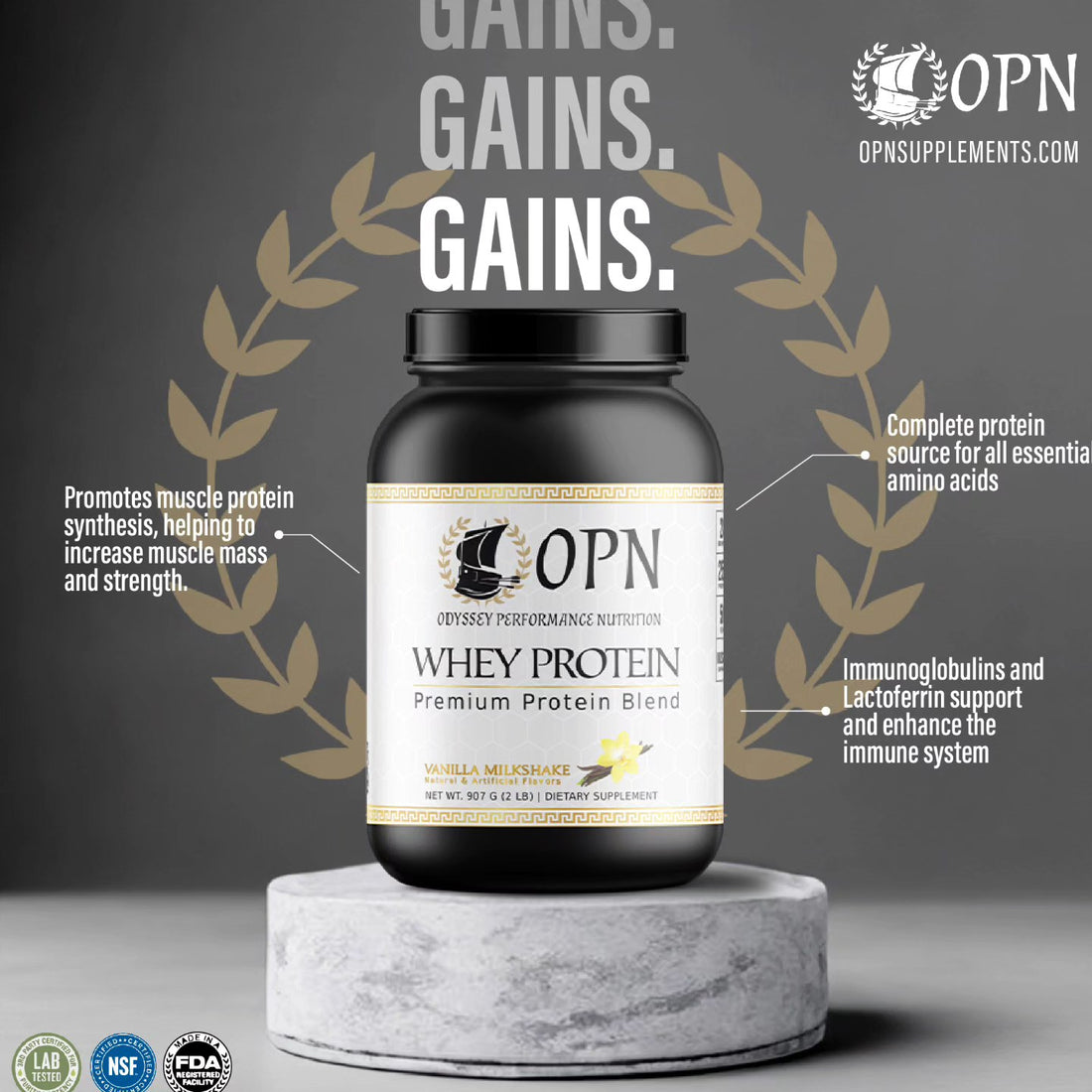
The Shocking Truth: Protein Isolate vs. Whey Protein for Your Fitness Goals
Share
Introduction
In the world of fitness and nutrition, protein supplements have become an essential component of many people’s diets. They are crucial for muscle growth, recovery, and overall health. Two popular forms of protein supplements are whey protein and protein isolate. While both are derived from the same source, they have distinct differences that can impact your fitness journey. In this post, we’ll explore these differences, discuss the health benefits of each, and help you decide which product from Odyssey Performance Nutrition is best suited to your needs.
Understanding Whey Protein
Whey protein is one of the most widely used supplements in the fitness industry. It is a complete protein, meaning it contains all nine essential amino acids required by the human body. Derived from milk, whey protein is a by-product of the cheese-making process. When milk is curdled and strained, whey is the liquid portion that remains.
How Whey Protein Is Made
The process of making whey protein starts with separating the whey from the milk. The liquid whey is then filtered to remove fats, lactose, and other unwanted components. This process results in a protein-rich powder that is then dried to produce whey protein concentrate. Whey protein concentrate typically contains around 70-80% protein, with the remaining percentage consisting of fats and lactose.
Benefits of Whey Protein
Whey protein is celebrated for its versatility and range of health benefits:
-
Muscle Growth and Repair: Whey protein is rich in branched-chain amino acids (BCAAs), particularly leucine, which is known to stimulate muscle protein synthesis. This makes it ideal for post-workout recovery and muscle growth.
-
Boosts Immune System: Whey protein contains immunoglobulins and lactoferrin, which are known to strengthen the immune system and protect against infections.
-
Convenience and Affordability: Whey protein concentrate is generally more affordable than whey isolate and can be easily added to shakes, smoothies, and other recipes.
Odyssey Performance Nutrition Whey Protein
For those looking for a high-quality whey protein, Odyssey Performance Nutrition’s Whey Armor Chocolate is an excellent choice. This product provides a balanced blend of protein, making it perfect for daily supplementation, whether you’re looking to build muscle, enhance recovery, or simply add more protein to your diet.
Understanding Protein Isolate
Protein isolate is a more refined version of whey protein concentrate. The key difference lies in the filtration process, which is more rigorous for protein isolate. This additional filtration removes a higher percentage of fats and lactose, resulting in a product that typically contains 90% or more protein per serving.
How Protein Isolate Is Made
The production of protein isolate involves additional steps to further filter and purify the whey. The goal is to remove as much fat and lactose as possible while maximizing the protein content. The result is a powder that is not only higher in protein but also lower in calories and carbohydrates compared to whey concentrate.
Benefits of Protein Isolate
Protein isolate offers several advantages, especially for those with specific dietary needs:
-
Higher Protein Content: With over 90% protein content, whey protein isolate provides a concentrated source of protein, which is beneficial for muscle building and recovery.
-
Low in Lactose: The additional filtration process reduces lactose content, making whey isolate a better option for individuals who are lactose intolerant.
-
Faster Absorption: Due to its purity, whey isolate is absorbed more quickly by the body, making it ideal for post-workout nutrition when your muscles need protein the most.
Odyssey Performance Nutrition Protein Isolate
For those who want the purest form of protein with minimal carbs and fats, Odyssey Performance Nutrition’s Whey Isolate Vanilla is a top pick. This product is perfect for anyone looking to optimize their protein intake without added calories or lactose.
Whey Protein vs. Protein Isolate: A Comparison
While both whey protein and protein isolate offer significant benefits, the choice between them depends on your individual goals, dietary needs, and preferences.
Protein Content
- Whey Protein: Contains 70-80% protein per serving, with the remainder being fats and carbohydrates.
- Protein Isolate: Contains 90% or more protein per serving, making it the more concentrated option.
Lactose Content
- Whey Protein: Contains more lactose, which might not be suitable for those who are lactose intolerant.
- Protein Isolate: Low in lactose due to the additional filtration process, making it a better option for sensitive stomachs.
Caloric Content
- Whey Protein: Slightly higher in calories due to the presence of fats and carbohydrates.
- Protein Isolate: Lower in calories, offering a leaner source of protein.
Absorption Rate
- Whey Protein: Absorbed relatively quickly, but not as fast as isolate.
- Protein Isolate: Absorbed at a faster rate, making it ideal for immediate post-workout recovery.
Cost
- Whey Protein: Generally more affordable, making it accessible for a wide range of budgets.
- Protein Isolate: Typically more expensive due to the additional processing required to achieve higher purity.
Health Benefits of Whey Protein and Protein Isolate
Both whey protein and protein isolate contribute to overall health beyond just muscle growth and recovery. Here’s how each can positively impact your well-being:
Weight Management
- Whey Protein: Helps in promoting satiety, reducing appetite, and supporting weight loss by preserving muscle mass during calorie deficits.
- Protein Isolate: Due to its higher protein content and lower calorie count, protein isolate can be even more effective in weight management programs.
Cardiovascular Health
- Whey Protein: Studies suggest that whey protein can help lower blood pressure, improve cholesterol levels, and reduce the risk of heart disease.
- Protein Isolate: Contains bioactive peptides that can further support cardiovascular health, especially in those looking to maintain a leaner physique.
Bone Health
- Whey Protein: High in calcium, which is essential for bone density and preventing osteoporosis.
- Protein Isolate: Also provides calcium, though in slightly lower quantities due to the filtration process.
Immune System Support
- Whey Protein: Contains components like lactoferrin and immunoglobulins that support immune function.
- Protein Isolate: While also beneficial for the immune system, the additional processing might reduce some of these components, though it remains a potent protein source.
Digestive Health
- Whey Protein: May contain more lactose, which could lead to digestive discomfort in some individuals.
- Protein Isolate: With reduced lactose content, protein isolate is easier on the stomach and better for those with lactose intolerance.
Which Should You Choose?
The choice between whey protein and protein isolate ultimately depends on your individual needs and goals.
-
Choose Whey Protein If:
- You’re looking for a cost-effective protein supplement.
- You don’t have lactose intolerance.
- You want a versatile protein powder that can be used for both muscle growth and overall nutrition.
-
Choose Protein Isolate If:
- You’re lactose intolerant or sensitive to dairy.
- You’re on a low-carb or low-fat diet.
- You want a protein supplement with a higher protein concentration and faster absorption.
For those who are undecided, you might consider incorporating both into your routine depending on your dietary needs at different times of the day or your workout schedule.
Conclusion
Understanding the differences between whey protein and protein isolate is crucial for optimizing your fitness and nutrition regimen. Both forms of protein offer unique benefits that can support your health, muscle growth, and recovery. Whether you choose Odyssey Performance Nutrition’s Whey Armor Chocolate or Odyssey Performance Nutrition’s Whey Isolate Vanilla, you’re investing in a high-quality supplement that can help you achieve your fitness goals. Even give our BRAND NEW flavor a try, Odyssey Performance Nutrition’s Whey Cookies & Creme Milkshake
Disclaimer: This article is for informational purposes only and should not replace professional medical advice. Always consult a healthcare professional before starting any new supplement regimen.
